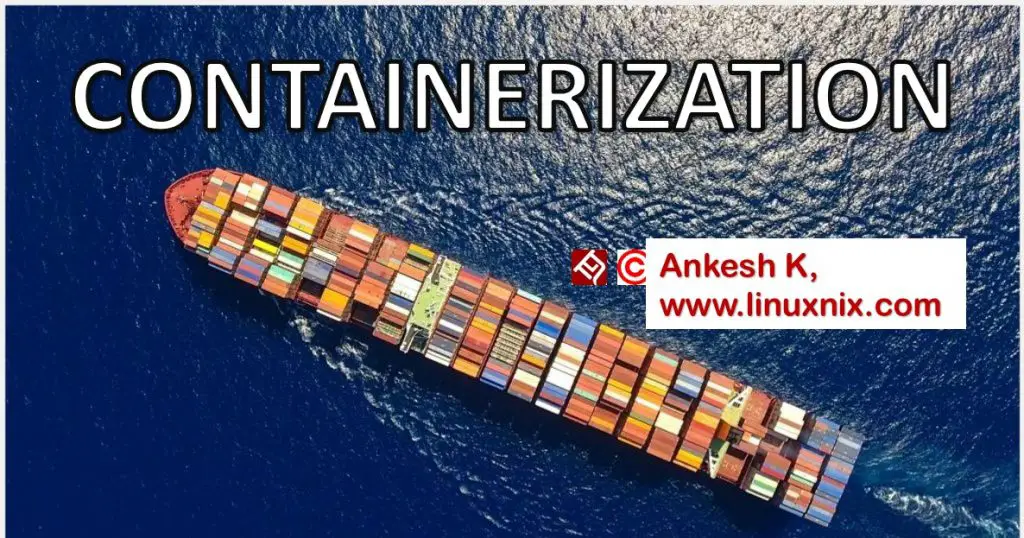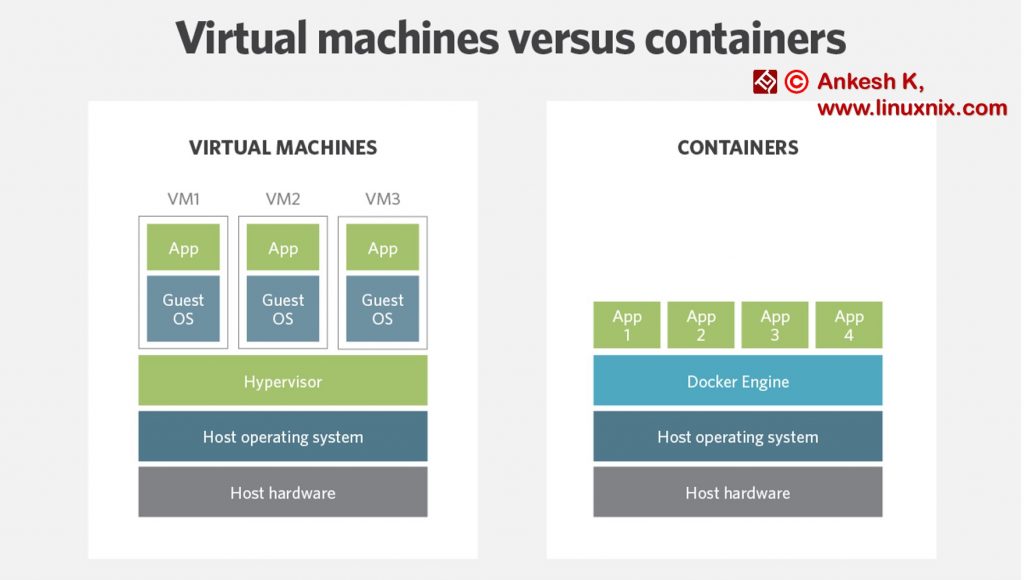What is Containerization?
Containerization is a lightweight alternative to a virtual machine that involves encapsulating an application in a container with its own operating system. A container takes its meaning from the logistics term, packaging container. When we refer to an application container, we mean packaging software.
Containerization has recently gained hypes with an open source tool Docker. Docker containers are designed to run on every environment from physical computers to virtual machines, from bare-metal, Clouds, etc.
Containerization vs. Virtualization (via Traditional Hypervisors)
The foundation of Containerization lies in the Linux Container (LXC) Format. This is why containers only work with Linux based machines and can only run Linux applications.
On the other hand, the traditional hypervisors like VMware, Virtual Box, etc can run on Windows, Linux as well as all those operating systems that support hypervisors.
Another difference is that containers share the same kernel as the host machine which is not in the case of hypervisors.
Containers vs Virtual Machines (VMs)
| Virtual Machines (VMs) | Containers |
| Hardware Level Virtualization | Operating System Virtualization |
| Heavyweight | Lightweight |
| Slow Provisioning | Real-time and fast provisioning |
| Limited performance | Native performance |
| Fully isolated | Process-level isolation |
| More Secure | Less Secure |
Application containers and System containers
Application containers, such as Docker comprised of the application files, dependencies and libraries of an application to run on an OS.
Multiple Application containers can be run for a micro-service based architecture where each service can make up the application run independently from one another.
On the contrary, System containers, such as LXC are similar to both application container and to the VMs. A system container can run an OS similar to how an OS would run in a VM.
Moreover, a system container doesn’t disturb the hardware of a system. It can be installed similarly as an application container and a user can install different libraries and dependencies.
Benefits of Containers
- Multi-Cloud Platform – One of the major benefit on Containers that it can operate on the cloud. They support a multi-cloud platform and can be run on AWS, GCP, Rackspace, and VirtualBox.
- Shares same OS – Containers share the same OS kernel as the host. So, containers can be more efficient than VM as it requires a separate OS to run.
- Testing and CI-CD – Containers are consistent throughout the application which modulates to an agile environment and the approaches like Continuous Integration and Continuous Delivery (CI-CD).
- Portability – Containers have better portability than other hosting technologies. The can move along any system. The container configuration is also portable as it is just a file to share.
- Version Control – This is one of the most important parts of the Software Development Life Cycle (SDLC). Docker offers version control that makes it easy to roll back to a previous image if your setup breaks.
- Cost-Efficient – Containers are also cost-efficient. In spite of investing in memory, CPU, and storage, it is possible to support many containers on the same infrastructure.
- Speed – Containers spins faster than VMs which is very important for distributed applications.
Disadvantages of Containers
- Security Concern – As the containers share a host, the potential threats are easy to penetrate to the system due to the lack of isolation which is not much in hypervisor-based virtualization.
- Lack of Isolation – Another issue with a container is the lack of OS flexibility which means containers must be of the same OS as of the Base OS. While in hypervisor-based virtualization, even Windows OS is able to virtualize both Windows as well as Linux based OS.
- Monitoring – It is hard to monitor containers when hundreds of containers are running on the same server.
- Features – Most of the big features in containers are still in development phase like a security tracking system, monitoring system, etc.
DevOps Culture and Containerization
In this advances world of AI and Automation, both DevOps and Containerization are growing rapidly. There is a demand to opt for cloud technology which allows users to operate from the palm of their hand.
On the other hand, where DevOps talk about CI-CD, Automation, IAC (Infrastructure as Code), etc, Containerization offers what they are looking for – a package of software that can be shipped.
With DevOps, the containers can be a boom as it is DevOps which automates and innovates the virtual process.
Container Platform Providers
There are many vendors which offer container platforms and container management tools. Below are some of the majorly used tools:
- Docker
- Google Kubernetes Engine
- CoreOS’rkt (Rocket)
- Portainer
- AWS ECR
- Azure Kubernetes Service
- Swarm
- Marathon
- Hashicorp Nomad
- Open Stack Magnum
Conclusion
Virtual machines and containers differ in several ways, but Containers are perfect for an enterprise which is looking for a solution that offers reliability, portability, versatility, and reproducibility in a virtual environment. The efficiency and cost competition that containerization-as-a-service (CaaS) can offer are driving its adoption.
To know more on Containerization and Docker, go through our practice sessions on Docker and its utilities.
Stay tuned with us @ linuxnix.com.
Latest posts by Ankesh K (see all)
- Deep-Dive into Jenkins – What are all Jenkins functionalities ? - January 10, 2019
- What are different Maven Plugins and how to build a Maven project? - January 7, 2019
- What is a Maven POM File and what are different Maven Repositories? - January 3, 2019
- What is Maven and what are its benefits? - December 31, 2018
- What are the different ways to install Jenkins ? - December 27, 2018






